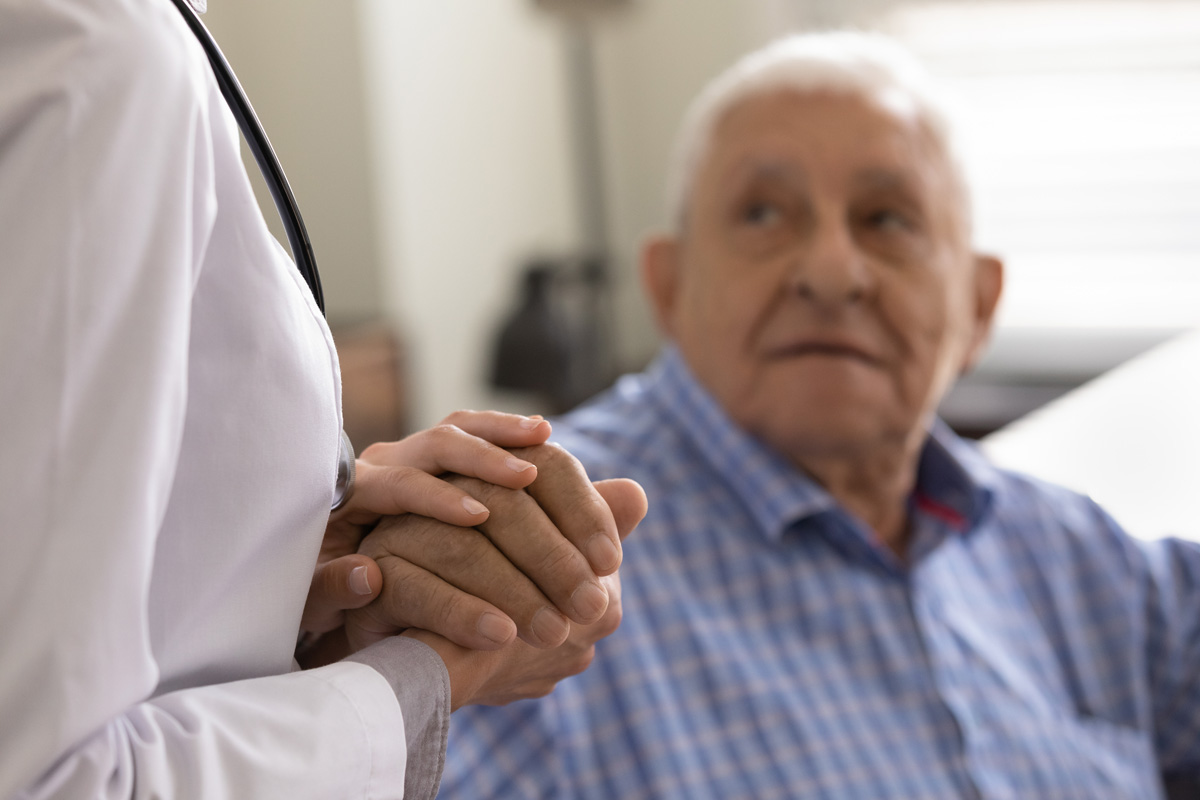- Home
- Conditions we treat
- Gastrointestinal cancer
- Large bowel cancer
What is large bowel (colorectal) cancer?
What is large bowel (colorectal) cancer?
Large bowel (colorectal) cancer refers to cancer that develops in the colon or rectum, which together make up the large intestine. This type of cancer usually develops from growths called polyps on the lining of the large bowel. These polyps may become cancerous over time if they are not detected and removed.1
Most bowel cancers affect the large bowel (colon and rectum). Cancer of the small bowel is rare and is treated differently.
There are several types of large bowel (colorectal) cancer, classified according to the type of cells involved.2
- Adenocarcinoma - This begins in the glandular cells lining the bowel. It is the most common type, accounting for approximately 90–95% of large bowel (colorectal) cancers
Less common types include:
- Neuroendocrine tumours (NETs)
- Lymphoma
- Sarcoma
- Squamous cell carcinoma (very rare in the bowel)
People with bowel cancer may not experience any symptoms at all and may only become aware of the condition through screening.1 However, many people do experience symptoms.1
These symptoms may include:1,2
- Changes in your usual bowel habit, such as constipation or diarrhoea
- Changes in the appearance or consistency of your stools, including thin bowel motions or mucus in the stool
- A feeling that your bowel has not completely emptied after a bowel movement
- Blood in the stool
- Abdominal pain, including bloating or cramping
- Anal or rectal pain
- A lump in the anus or rectum
- Unexplained weight loss
- Unexplained fatigue
- Tiredness and/or anaemia, which may cause paleness, weakness, or shortness of breath
Having one or more of these symptoms does not necessarily mean you have large bowel (colorectal) cancer. However, it is important to speak with your GP or specialist if you have ongoing symptoms, questions, or concerns.
It is not always clear what causes large bowel (colorectal) cancer. However, there are a number of factors that may increase a person’s risk. Risk factors may include:,1,2
- Being aged 50 years or older
- Having polyps in the bowel
- Carrying excess body weight
- Alcohol consumption
- Smoking tobacco
- Dietary factors, including:
- A diet high in red or processed meats, such as ham or salami
- A diet low in fibre
- A close family history of bowel cancer, such as a parent, brother, or sister
- Risk may be higher if a family member was diagnosed before the age of 55, or if two or more close relatives on the same side of the family have had bowel cancer
- Certain inherited genetic conditions
- Inflammatory bowel disease, including:
- Crohn’s disease
- Ulcerative colitis
- Having previously been diagnosed with bowel cancer
Having one or more of these risk factors does not mean you will develop large bowel (colorectal) cancer. If you have any questions or concerns about your risk, it is important to speak with your GP or specialist.
Make an enquiry
Contact us today to find out how GenesisCare can help you.
Diagnosis
Diagnosing large bowel cancer
Your doctor can discuss your symptoms and medical history with you. Tests used to diagnose colorectal cancer may include: 1-3
- Blood tests – to check for signs of blood loss and to assess red blood cell levels, which may indicate anaemia
- Faecal blood test – involves collecting a stool sample at home, which is tested for traces of blood. This test does not diagnose cancer, but if blood is detected your doctor may recommend further investigations
- Colonoscopy – considered the most comprehensive test for colorectal cancer. A thin camera is inserted into the anus to examine the entire large bowel, usually under anaesthetic. Any abnormal tissue can be removed or biopsied for further examination
- Flexible sigmoidoscopy – performed in a similar way to a colonoscopy, but examines only the rectum and lower (left) part of the colon. Abnormal tissue may be removed or biopsied
- Computed tomography (CT) scan – produces detailed cross-sectional images of the body and can help determine whether cancer has spread, as well as assist with treatment or surgical planning
- Magnetic resonance imaging (MRI) scan – provides detailed images that can help assess the size and extent of tumours
- Positron emission tomography (PET) scan – creates three-dimensional images that help show areas of cancer activity within the body
Additional tests may include:
- Biopsy – the removal of a small sample of tissue from the bowel wall, which is examined for cancer. A biopsy is usually performed during a colonoscopy
- Imaging scans – such as X-ray, CT, ultrasound, MRI, or PET scans, which may be used to assess the extent of disease or whether cancer has spread

Find a doctor
Search for a cancer specialist in your state.
Treatment options
Treatment options for large bowel cancer
Treatment for colorectal cancer will usually depend on what your treating team decides is right for your case and may include:3-6
Radiation therapy, also called radiotherapy, helps to kill cancer cells. Radiation therapy uses controlled doses of radiation to damage or destroy cancer cells, and can be delivered from outside the body (called external beam radiation therapy, or EBRT) or from inside the body (called brachytherapy).4,5
Radiation therapy may be offered in the early stages of cancer treatment, or after it has started to spread. Different radiation therapy techniques may be suitable for different cancer types at different stages.4,5
Chemotherapy - Chemotherapy is an approach to cancer therapy that involves the administration of medicine, usually orally or by injection, which is intended to kill cancer cells or minimise their growth and spread. Chemotherapy can be used in conjunction with other cancer treatments.
Surgery is a common treatment option for large bowel (colorectal) cancer, and the type of surgery recommended will depend on where the cancer is located in the bowel, as well as your individual preferences and overall health.
Surgery may be suggested for both early-stage and more advanced bowel cancer, either to remove the cancer or to help manage symptoms. It is performed under a general anaesthetic, and recovery time can vary depending on the extent and type of surgery required. Your doctor is the best person to discuss which surgical approach is most appropriate for you and to explain what to expect before and after treatment.
Targeted therapy medicines are designed to act on specific features of cancer cells. Some targeted therapies work by mimicking antibodies that the body naturally produces. These medicines attach to specific proteins on cancer cells, which can help slow or stop cancer growth and may assist the immune system in recognising and attacking the cancer.6
Immunotherapy is a type of cancer treatment that helps your own immune system recognise and attack cancer cells. There are different types of immunotherapy, and they work in different ways.6

Treatment side effects
All cancer treatments can cause side effects, and the type and severity will vary between individuals. You should ask your doctor for detailed information about the possible side effects of any treatment recommended for you.
Find a centre
Search for consulting and treatment locations near you.
Support services
Support services
- Cancer Council Australia. (2023, March). Understanding bowel cancer. Retrieved February 2024, from https://www.cancercouncil.com.au/wp-content/uploads/2023/03/Understanding-Bowel-Cancer-2023.pdf
- Cancer Council Australia. (2023, October). Types of bowel cancer. Retrieved February 2024, from https://www.cancer.org.au/cancer-information/types-of-cancer/bowel-cancer
- Cancer Council Australia. (2023, June). Cancer, work and you. Retrieved February 2024, from https://www.cancercouncil.com.au/wp-content/uploads/2023/06/Cancer-Work-and-You-2023.pdf
- Cancer Council. (2023, March). Understanding radiation therapy. Retrieved August 2025, from https://www.cancer.org.au/assets/pdf/understanding-radiation-therapy-booklet
- Symonds, P., & Walter, J. (2012). Walter and Miller’s textbook of radiotherapy: Radiation physics, therapy and oncology. Churchill Livingstone.
- Cancer Council Victoria. (2025, September). Treatment for advanced bowel cancer. Retrieved September 2025, from https://www.cancervic.org.au/about-cancer/types/bowel_cancer/treatment_for_advanced_bowel_cancer

You are leaving our website
You are now leaving our website. GenesisCare do not control this content and therefore are not responsible for its accuracy or reliability.
Disclaimer:
This website is provided for information purposes only. Nothing on this website is intended to be used as medical advice, or to diagnose, treat, cure or prevent any disease. It should not be used as a substitute for your own health professional's advice. Any medical procedure or treatment carries risks. Before proceeding with treatment, you should discuss the risks and benefits of the treatment with an appropriately qualified health practitioner. Individual treatment outcomes and experiences will vary.



